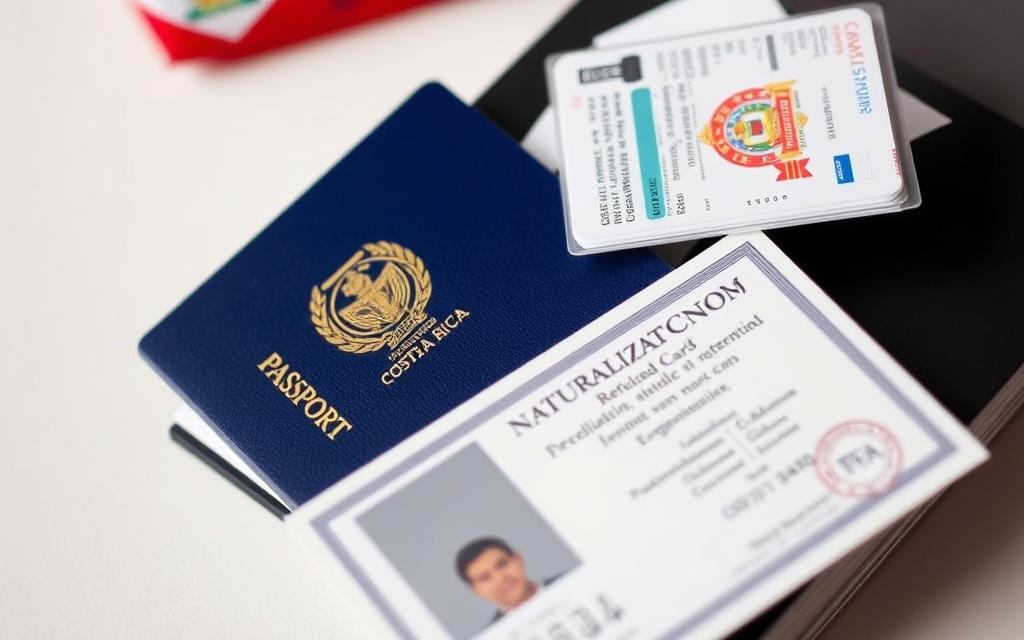Discover hard money loans for Costa Rica developers. Get access to significant funds with competitive rates and flexible financing options.

We Guide You Through Costa Rica Dual Citizenship Rules
Securing a Costa Rican passport opens doors to unparalleled opportunities, providing individuals with freedom, security, and global access. With over 20 years of experience, Costa Rica Immigration Experts (CRIE) has helped numerous clients achieve their dream of living in Costa Rica.
Navigating the complex world of dual citizenship can be challenging, especially when dealing with specific legal requirements and procedures. CRIE’s expertise ensures a smooth transition to becoming a Costa Rican citizen, enriching one’s personal and professional life while embedding them into the vibrant culture and community.
Understanding the pathways and benefits of Costa Rican dual citizenship is essential for making informed decisions about your immigration journey. With comprehensive guidance through every step of the process, CRIE provides the necessary support for a successful application.
Understanding Dual Citizenship in Costa Rica
The concept of dual citizenship is gaining traction globally, with Costa Rica being a prime example. Dual citizenship refers to the status of being a citizen of two countries simultaneously, offering numerous benefits, including easier travel, living, and working across borders.
What is Dual Citizenship?
Dual citizenship allows individuals to enjoy rights and privileges from both countries, making it an attractive option for expatriates and individuals with ties to multiple countries.
In Costa Rica, dual citizenship is permitted and can be acquired through various means, including birth, naturalization, marriage, or investment.
Costa Rica’s Legal Framework for Dual Nationality
Costa Rica’s legal framework explicitly allows dual citizenship, making it an attractive destination for expatriates who wish to integrate into Costa Rican society without relinquishing their original nationality.
The country’s laws accommodate various pathways to citizenship, including through birth, descent, marriage, and residency-based naturalization, providing a transparent process for applicants.
Pathways to Costa Rica Dual Citizenship
Costa Rica offers various pathways to dual citizenship, catering to different individual circumstances. This flexibility allows individuals to choose the most suitable route based on their personal situation.
Citizenship by Birth or Descent
Citizenship by birth is automatically granted to children born in Costa Rica to at least one Costa Rican parent. Similarly, citizenship by descent applies to children born abroad to Costa Rican parents, providing them a straightforward path to dual citizenship.
Citizenship Through Marriage
Marrying a Costa Rican citizen opens the door to applying for citizenship, provided specific requirements are met. Individuals must maintain a valid marriage to a Costa Rican citizen for at least two years and reside in Costa Rica consecutively for the same duration.
Citizenship Through Residency
Expatriates living in Costa Rica can apply for citizenship through residency after meeting certain requirements. Individuals who have held temporary or permanent residency visas for seven years if from English-speaking countries, or five years for Spanish-speaking countries, are eligible. They must also pass written tests in Spanish and Social Studies, although applicants over sixty-five are exempt.
The pathways to Costa Rican citizenship include:
- Costa Rica offers multiple pathways to citizenship, each with its own set of requirements and timelines.
- Citizenship by birth is granted to children born in Costa Rica to at least one Costa Rican parent.
- The marriage pathway requires a valid marriage to a Costa Rican citizen for at least two years while residing in the country.
- For those pursuing citizenship through residency, the naturalization process requires maintaining legal residency status for a specified period.
- Each pathway involves a distinct application process with specific documentation requirements.
- The residency-based path requires demonstrating integration into Costa Rican society, including knowledge of Spanish and Costa Rican culture.
Residency Requirements for Dual Citizenship
The journey to dual citizenship in Costa Rica begins with fulfilling the residency requirements. To get dual citizenship, you need a valid residency permit for at least five years, which is crucial for understanding the local culture and laws.
Temporary vs. Permanent Residency
Costa Rica offers both temporary and permanent residency options. Temporary residency typically lasts for two years and requires renewal, while permanent residency provides a more stable long-term status. The transition from temporary to permanent residency usually occurs after three years of continuous legal residence in Costa Rica.
Time Requirements Based on Country of Origin
Time requirements for citizenship eligibility vary based on the applicant’s country of origin. For instance, citizens from Spanish-speaking countries have a shorter path of five years, compared to seven years for citizens from English-speaking countries. Maintaining continuous residency is crucial, as extended absences can reset the citizenship eligibility clock.
For more information on the benefits of dual citizenship, you can visit https://crie.cr/perks-of-dual-citizenship-in-costa-rica/ to learn about the perks of having dual citizenship in Costa Rica.
Documentation Needed for Costa Rica Citizenship

Gathering the required documents is a crucial step in the Costa Rican citizenship application process. Applicants must ensure they gather all required paperwork carefully to avoid delays in the process.
Essential Documents and Their Authentication
The documentation phase requires meticulous attention to detail. Essential documents include:
- A birth certificate with an apostille or legalization
- A background check with an apostille or legalization
- Passport-size pictures
- A valid passport with an entry stamp
- Official translations into Spanish of the required documents
All official documents from foreign countries must be properly authenticated through either an apostille or legalization, depending on whether the issuing country is a member of the Hague Convention.
Language and Cultural Knowledge Requirements
Beyond documentation, applicants must demonstrate proficiency in the Spanish language through a written examination, though exceptions may apply for applicants over 65 years of age. Cultural knowledge requirements include passing an examination on Costa Rican history, geography, civics, and social studies.
- Witness statements from Costa Rican citizens are also required to attest to the applicant’s character and integration into the community.
- Organizing these documents in advance and ensuring they meet all requirements can significantly streamline the application process and improve chances of approval.
The Application Process Timeline
The application process for Costa Rican citizenship is a multi-step journey that typically spans ten to twelve months from the initial submission to final approval. Understanding this timeline is crucial for applicants to plan their journey effectively.
Step-by-Step Application Procedure
The process begins with the submission of a complete application package to the Department of Immigration, including all required documentation and proof of meeting residency requirements. The initial document review takes approximately two to three months, during which immigration officials verify the authenticity and completeness of all submitted materials.
- Submission of application and required documents
- Initial document review by the Department of Immigration
- In-person interview at the Costa Rica consulate or local immigration office
- Language and cultural knowledge examinations
Expected Processing Times
Applicants are usually called for an in-person interview around four to six months into the process. Following the interview, there is a detailed evaluation phase that takes an additional two to three months. Successful applicants receive notification of approval and instructions for obtaining their Costa Rican passport and other citizenship documents.
The total processing time typically ranges from ten to twelve months, though individual cases may vary. It is essential for applicants to be prepared to remain in Costa Rica throughout much of the process and respond promptly to any requests for additional information.
Benefits of Holding Costa Rican Citizenship
Holding Costa Rican citizenship offers a unique blend of global mobility, economic opportunities, and cultural enrichment. This status not only simplifies international travel but also enhances one’s ability to integrate into Costa Rican society.
Visa-Free Travel Opportunities
A Costa Rican passport provides visa-free or visa-on-arrival access to approximately 149 countries worldwide, significantly enhancing global mobility for dual citizens. This travel freedom is a major advantage for business professionals, digital nomads, and frequent travelers.
Employment and Property Rights
As full citizens, dual nationals enjoy unrestricted employment rights in Costa Rica, eliminating the need for work permits and opening doors to career opportunities in the local economy. Property ownership becomes simpler and more secure with citizenship status, as certain restrictions that apply to foreign investors no longer affect Costa Rican citizens.
Cultural and Social Advantages
Dual citizens gain full access to Costa Rica’s renowned healthcare system and can participate in shaping the country’s future through voting in national elections. For more information on Costa Rica’s dual citizenship policies, visit https://crie.cr/does-costa-rica-allow-dual-citizenship-2/. The cultural advantages of dual citizenship include deeper integration into Costa Rican society, facilitating authentic connections with local communities and traditions.
Conclusion: Expert Guidance for Your Citizenship Journey
Costa Rica’s unique blend of cultures and stable political environment make it an attractive destination for those seeking dual citizenship. The process of obtaining dual citizenship in Costa Rica can be complex, but with expert guidance, applicants can navigate the legal requirements efficiently.
The benefits of dual citizenship extend beyond travel convenience, offering enhanced global mobility, economic opportunities, and a richer cultural experience. By choosing Costa Rica, individuals can enrich their personal and professional lives while becoming part of a vibrant community.
For a seamless application process, it is advisable to seek professional assistance. Costa Rica Immigration Experts (CRIE) offers personalized guidance and support, ensuring that applicants meet all necessary criteria. To begin your journey toward Costa Rican citizenship, contact CRIE at +506 8706-3888 or via email at info@crie.cr for a consultation.


